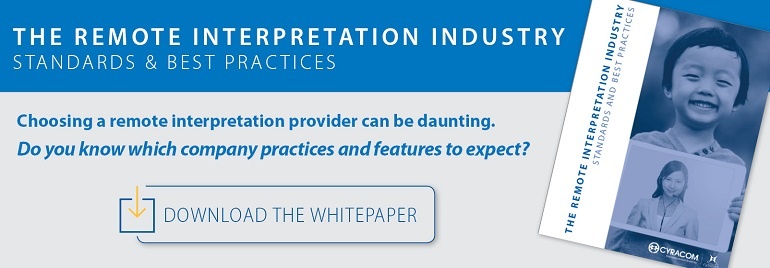
Interpreting is a highly specialized profession that requires training and practice. Professional-level interpreters acquire and develop many skills beyond being merely bilingual. Here are five skills that quality, professional interpreters possess:
- LANGUAGE SKILLS
An interpreter needs extensive, high-level knowledge and vocabulary in both their native and secondary languages in order to be effective. They also need to understand terminology from a variety of industries, from medical to insurance to banking.
- LISTENING AND RECALL
There are two main interpreting methods: consecutive interpreting and simultaneous interpreting. Consecutive interpreting requires waiting until a speaker pauses before interpreting. This modality requires intense active listening, memory recall, and note-taking to produce an accurate interpretation, since the speaker may speak for several minutes without pausing.
Interpreting requires more brain power than usual. Scientists have conducted experiments on bilingual subjects and found when a person transitions between two languages, the brain uses regions not active in normal language use. This suggests that interpreting takes greater coordination of mental operations and that the phonological processing is more difficult when having to switch languages.
- ETHICAL BEHAVIOR
Interpreters may encounter confidential or sensitive information. They must understand the strong regulatory environment surrounding patient and consumer privacy.
Ethical behavior extends beyond just keeping what you’ve heard to yourself. The US Courts website states that an interpreter must be both impartial and “able to accurately and idiomatically turn the message from the source language into the receptor language without any additions, omissions or other misleading factors that alter the intended meaning of the message from the speaker.” An interpreter who interprets unethically in a medical scenario could have an impact on the ability of the physicians to save a person’s life.
- CULTURAL KNOWLEDGE
Being bicultural is just as important for qualified interpreters as being bilingual. Bicultural individuals have naturally absorbed the sensibilities and nuances of two cultures and have inherent abilities to mediate between them.
- SUBJECT KNOWLEDGE
It is critical that an interpreter understands the subject material of a conversation they need to interpret. Without properly understanding the context of a conversation, interpreters would have difficulty interpreting correctly in a way that both parties can understand.
Ready to learn more about the remote interpretation industry? Check out our whitepaper:











